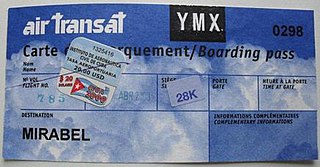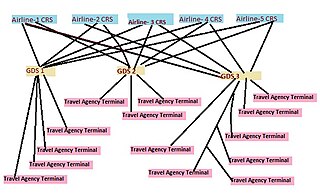Related Research Articles

A codeshare agreement, also known simply as codeshare, is a business arrangement, common in the aviation industry, in which two or more airlines publish and market the same flight under their own airline designator and flight number as part of their published timetable or schedule. Typically, a flight is operated by one airline while seats are sold for the flight by all cooperating airlines using their own designator and flight number.
Yield management is a variable pricing strategy, based on understanding, anticipating and influencing consumer behavior in order to maximize revenue or profits from a fixed, time-limited resource. As a specific, inventory-focused branch of revenue management, yield management involves strategic control of inventory to sell the right product to the right customer at the right time for the right price. This process can result in price discrimination, in which customers consuming identical goods or services are charged different prices. Yield management is a large revenue generator for several major industries; Robert Crandall, former Chairman and CEO of American Airlines, gave yield management its name and has called it "the single most important technical development in transportation management since we entered deregulation."
A passenger name record (PNR) is a record in the database of a computer reservation system (CRS) that contains the itinerary for a passenger or a group of passengers travelling together. The concept of a PNR was first introduced by airlines that needed to exchange reservation information in case passengers required flights of multiple airlines to reach their destination ("interlining"). For this purpose, IATA and ATA have defined standards for interline messaging of PNR and other data through the "ATA/IATA Reservations Interline Message Procedures - Passenger" (AIRIMP). There is no general industry standard for the layout and content of a PNR. In practice, each CRS or hosting system has its own proprietary standards, although common industry needs, including the need to map PNR data easily to AIRIMP messages, has resulted in many general similarities in data content and format between all of the major systems.

A boarding pass or boarding card is a document provided by an airline during airport check-in, giving a passenger permission to enter the restricted area of an airport and to board the airplane for a particular flight. At a minimum, it identifies the passenger, the flight number, the date, and scheduled time for departure. A boarding pass may also indicate details of the perks a passenger is entitled to and is thus presented at the entrance of such facilities to show eligibility.

An electronic ticket is a method of ticket entry, processing, and marketing for companies in the airline, railways and other transport and entertainment industries.

ITA Software is a travel industry software division of Google, formerly an independent company, in Cambridge, Massachusetts. The company was founded by Jeremy Wertheimer, a computer scientist from the MIT Artificial Intelligence Laboratory and Cooper Union, with his partner Richard Aiken in 1996. On July 1, 2010, ITA agreed to be acquired by Google. On April 8, 2011, the US Department of Justice approved the buyout. As part of the agreement, Google was required to license ITA software to other websites for five years.

Bag tags, also known as baggage tags, baggage checks or luggage tickets, have traditionally been used by bus, train, and airline carriers to route checked luggage to its final destination. The passenger stub is typically handed to the passenger or attached to the ticket envelope:
- to aid the passenger in identifying their bag among similar bags at the destination baggage carousel;
- as proof—still requested at a few airports—that the passenger is not removing someone else's bag from the baggage reclaim hall; and
- as a means for the passenger and carrier to identify and trace a specific bag that has gone astray and was not delivered at the destination. The carriers' liability is restricted to published tariffs and international agreements.

Check-in is the process whereby people announce their arrival at an office, hotel, airport, hospital, seaport or event.

A global distribution system (GDS) is a computerised network system owned or operated by a company that enables transactions between travel industry service providers, mainly airlines, hotels, car rental companies, and travel agencies. The GDS mainly uses real-time inventory from the service providers. Travel agencies traditionally relied on GDS for services, products and rates in order to provide travel-related services to the end consumers. Thus, a GDS can link services, rates and bookings consolidating products and services across all three travel sectors: i.e., airline reservations, hotel reservations, car rentals.

The Air Passengers Rights Regulation 2004 is a regulation in EU law establishing common rules on compensation and assistance to passengers in the event of denied boarding, flight cancellations, or long delays of flights. It requires compensation of €250 to €600 depending on the flight distance for delays over of at least three hours, cancellations, or being denied boarding from overbooking. Delays shorter than three hours means no entitlement to any compensation of any kind even if the delay was classified as non-extraordinary. Airlines must provide refreshments and accommodation where appropriate. The Court of Justice of the European Union has interpreted passenger rights strictly, so that there are virtually no exceptions for airlines to evade their obligations for breach of contract.
Overselling or overbooking is sale of a volatile good or service in excess of actual supply. Overselling is a common practice in the travel and hospitality sectors, in which it is expected that some people will cancel. The practice occurs as an intentional business strategy in which sellers expect that some buyers will not consume all of the resources they are entitled to, or that some buyers will cancel. The practice of overselling aims to ensure that 100% of available supply will be used, resulting in the maximum return on investment. However, if more customers than the seller expects do wish to purchase or use the sold commodity, it may leave some customers lacking a service they expected to receive.
Boarding is the entry of passengers onto a vehicle, usually in public transportation. Boarding starts with entering the vehicle and ends with the seating of each passenger and closing the doors. The term is used in road, rail, water and air transport.

Airport check-in is the process whereby an airline approves airplane passengers to board an airplane for a flight. Airlines typically use service counters found at airports for this process, and the check-in is normally handled by an airline itself or a handling agent working on behalf of an airline. Passengers usually hand over any baggage that they do not wish or are not allowed to carry in the aircraft's cabin and receive a boarding pass before they can proceed to board their aircraft.

An airline ticket is a document or electronic record, issued by an airline or a travel agency, that confirms that an individual is entitled to a seat on a flight on an aircraft. The airline ticket may be one of two types: a paper ticket, which comprises coupons or vouchers; and an electronic ticket.
Airline reservation systems (ARS) are systems that allow an airline to sell their inventory (seats). It contains information on schedules and fares and contains a database of reservations and of tickets issued. ARSs are part of passenger service systems (PSS), which are applications supporting the direct contact with the passenger.
Videcom International Limited is a United Kingdom travel technology company based in Henley-on-Thames. It designs, develops and provides modern computer reservations systems to airlines and the travel industry, specializing in the hosting and distribution of airline sales.
Alternate air ticket purchasing order systems allow for alternative ways of purchasing air tickets and GDS Connectivity not involving Internet or personal TA contact.
Multi-Aero, Inc., doing business as Air Choice One, a division of Southern Airways Corporation, was an American commuter airline with its headquarters in Concord, Missouri, within the Greater St. Louis area. It operated as a regional airline offering commuter flights from St. Louis Lambert International Airport to smaller regional airports, subsidized under the Essential Air Service program. Air Choice One's callsign, "Weber," is in honor of Mike Weber, the airline's first Chief Pilot.
A departure control system (DCS) automates processing an airline's airport management operation, which includes managing the information required for airport check-in, printing boarding cards, baggage acceptance, boarding, load control and aircraft checks.
An airfare is the fee paid by a passenger for air transport and is made up of the charge for a passenger to fly from an origin to destination and includes the conditions, rules and restrictions for travelling on the airfare.
References
- ↑ "Passenger Service System (PSS)". AltexSoft. Retrieved 2023-10-23.